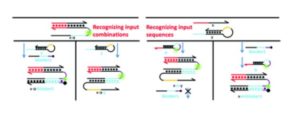Yizhen Liu published his first independent article with ChemComm in 2016. We wanted to find out more about Yizhen’s experience as a first-time author and what it was like to publish with our journal. Check out his #ChemComm1st article here: A DNA kinetics competition strategy of hybridization chain reaction for molecular information processing circuit construction.
Read more from Yizhen below:
What are the main areas of research in your lab and how has your research progressed since publishing your first article?
My laboratory mainly focus on DNA molecular circuits and biosensors related to DNA single base mutation detection. Based on DNA chain replacement and toehold exchange reaction, we constructed a series of DNA molecular logic devices (4 ChemComm in total). The first work reported DNA three-digit keypad lock, and then we successively constructed 4 to 2 encoders, computational redundant modules and three-bit molecular registers. In the work of the 4 to 2 encoder, for the first time we combined the logic judgment function of DNA circuit with the detection of single base mutation, so that the sensor based on hybridization analysis can not only recognize the presence of single base mutation, but also realize the information feedback of the mutation site region.
What do you hope your lab can achieve in the coming year?
In the coming year, we hope to make breakthroughs in specific enrichment and intelligent sensing of low abundance SINGLE base mutations in DNA.
Describe your journey to becoming independent researcher.
I obtained my Bachelor’s degree in Chemistry (2008) and Doctoral degree in Analytical Chemistry (2014) from Wuhan University. My doctoral thesis was on nucleic acid colorimetric sensing based on DNA gold nanoparticles and surface-enhanced Raman analysis method. During this process, I developed a strong interest in DNA circuits. Using molecules to build computing hardware can well combine my major with my hobby in computer science. Therefore, after I got recruited by Shenzhen University as an independent researcher, I focused more on the fields related to DNA nanotechnology, and by attending professional academic conferences and learning from excellent reports of domestic and foreign researchers, my understanding of this frontier field has sufficiently deepened. My first review invitation as an independent researcher also came from ChemComm. Being a reviewer has greatly helped me to stick to the current academic frontier and offered me inspiration in my research.
What is the best piece of advice you have ever been given?
As my father always teaches me that “details determine success or failure”, I am strict with myself in every thing I do in my work and life, paying attention to every detail and always thinking twice, which has indeed brought me many successes, big and small.
Why did you choose to publish your first article in ChemComm?
In fact, my first academic paper was published in ChemComm. ChemComm is very friendly to young researchers and encourages all kinds of novel ideas to be published, which impressed me a lot. In 2016, together with my sophomore students, I was very glad to publish my first paper (and the third one in my academic career) in ChemComm as an independent researcher. We modified the hybridization chain reaction to construct a molecule-level DNA three-digit keypad lock, and were honored to be selected as the outside front cover paper. This bond between ChemComm and my academic career has been continuously strengthened and I sincerely wish ChemComm a prosperous future!
| Biography: Yizhen Liu is an Associate Professor of College of Chemistry and Enviromental Engineering at Shenzhen University. Liu obtained his BAchelor’s degree in Chemistry (2008) and Doctoral degree in Analytical Chemistry (2014) from Wuhan University. His thesis work with Prof. Jiming Hu focused on colorimetric and surface-enhanced Raman biosensors based on DNA gold nanoparticles. After receiving his PhD in 2014, he joined the College of Chemistry and Environmental Engineering at Shenzhen University to start his independent research. His current research interests include DNA logic circuits, DNA sensing methods and efficient solar seawater desalination technologies. Outside the lab, you might find him occasionally wandering the PUBG world, training in team leadership. Find him: yzliu@szu.edu.cn |  |











